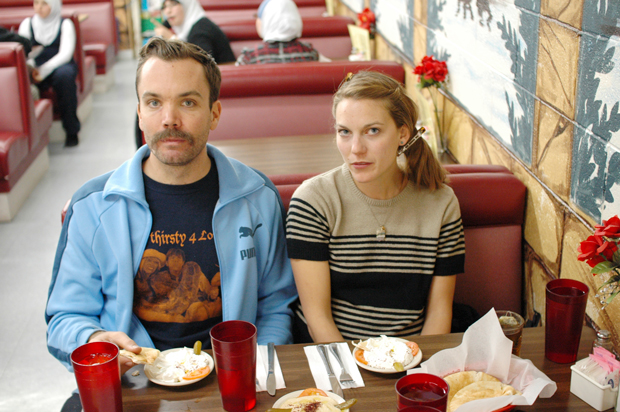An article written for the April edition of Time Out Sao Paulo, previewing an upcoming appearance by Arthur Verocai at Sao Paulo’s SESC Pinheiros venue. Continue reading Preview: Arthur Verocai at SESC Pinheiros
Review: The Roots of Chicha 2
Review of The Roots of Chicha 2 compilation album, collecting together peruvian cumbia from the 60s, 70s and 80s. Continue reading Review: The Roots of Chicha 2
Slacker Like Myself: An Interview with Prefab Sprout
Their is simply something very special about Paddy McAloon and the work he makes as Prefab Sprout. I think it’s the passion for songwriting that shines through everything he writes. In the autumn of 2010 I got the chance to interview Paddy, though I would have to do this by email, which would then be printed off and passed onto him. He responded by typing up his answers and then faxing it through to PopMatters who then scanned it in and emailed it to me. For some reason this process makes me feel very strongly about this interview. Continue reading Slacker Like Myself: An Interview with Prefab Sprout
Interview with Cibelle
My interview with Cibelle, conducted during a very hot summer’s morning in 2010 after I had drank way too much the night before. I believe I arrived about 20 minutes late, which is never a great sign! Here’s how the article started:
I took an instant liking to Cibelle. She seemed so unpretentious about her music and excited by happy accidents, which made me feel less bad for being late for the interview. I figured her free-spiritedness could be due to the fact that her career had never followed any set path, yet had continued to prosper, or at least this was how it seemed to me. After appearing on Suba’s Sao Paulo Confessions album, a modern mix of electronica and bossa nova, she recorded her self-titled debut album in a similar vein. The album was well-received but it was her second The Shine of Dried Electric Leaves that sealed her status in Europe, no doubt helped by her covers of Caetano Veloso and Tom Waits songs and collaboration with Devendra Banhart. It was a mix of acoustic guitars, studio experimentation and a fresh sound that passed through songs both in English and Portuguese.
You can read the article in full at Drowned In Sound.
Originally published on 2nd July 2010.

The Wire MP3 Special
I wrote an article on the underground scene in Sao Paulo for the May edition of The Wire, an English magazine subtitled Adventures In Modern Music. To accompany the article they asked me to get a few tracks together for their website. I managed to get songs together from Metá-Metá, Bodes e Elefantes, Lucas Santtana, Lulina, Criolo and Rodrigo Brandao for this. You can listen to these songs at The Wire’s website here:
A Comfortable Outsider: Interview with A Hawk and A Hacksaw
My interview with Jeremy Barnes of A Hawk and A Hacksaw has just been published by Drowned In Sound. Here’s how it starts:
Ever since I first saw Jeremy Barnes perform as A Hawk and A Hacksaw in Nottingham’s Bunker’s Hill Inn I have kept a close eye on this group of his. At that point it was just a solo project, involving one man with a drum kit and accordion, playing cymbals with the drumsticks that were attached to his head. It was clear that his music was moving in a different direction to his earlier work with Bablicon and Neutral Milk Hotel.
In 2004 he met Heather Trost and A Hawk and a Hacksaw become a two-piece, decamping to Budapest, Hungary, which seemed to complete the direction in sound Barnes had been taking; the influence of Eastern European music was now unredoubtable. It’s something they’ve explored considerably since, right up to Cervantine, released earlier this year.
You can read the article in full at Drowned In Sound.

The impact of tropicalia rumbles on!
Without question one of my favourite styles of music is tropicália. Without it I wouldn’t be able to freak out to the sounds of Os Mutantes, bask in the glory of Caetano Veloso’s words, groove to Gilberto Gil and generally sit in astonishment at the sheer unbridled joy of Rogerio Duprat’s arrangements. With a covers compilation approaching this summer and a documentary in the works it seems as if a few people may well get to discover a little more about this music also. Continue reading The impact of tropicalia rumbles on!
A History of Tropicália
This piece has just been published at Latineos, a history of Tropicália, one of the most joyful styles of music ever to emerge from this planet. Here’s the intro:
It would be near impossible to recreate the circumstances that resulted in tropicália. In 1967, Brazil’s repressive military government had been in charge for three years and Brazilian music was in status quo. The authorities were happy that samba was the favourite music of the nation – they saw it as the perfect marketing tool – and didn’t see the need for change. This was a climate in which João Gilberto’s beautiful hybridisation of samba into bossa nova drew stinging criticisms from those who thought it was un-Brazilian. Continue reading A History of Tropicália
Looking for Album Reviewers
This is a call for anyone who is interested in reviewing albums by Latin American, Caribbean or even other World Music artists to get in touch. I currently work for Sounds and Colours, and JungleDrums Online, and we are both continually looking for new reviewers. If you are interested please get in touch.
Interview: Tiptoeing Thru the Tulips with Tulipa
This article was written for JungleDrums Online and was published on 4th April 2011. The interview took place in London the week before. The photos featured in the article (and which I’ve also included here) are by Caroline Bittencourt. Continue reading Interview: Tiptoeing Thru the Tulips with Tulipa